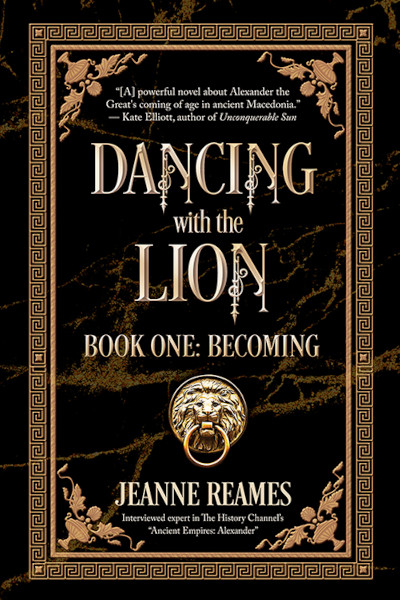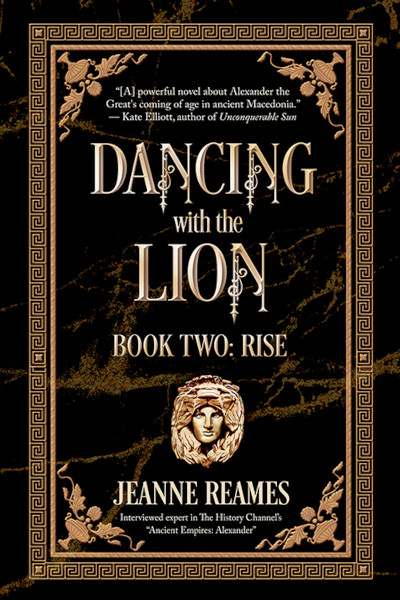# Please
introduce yourself and your books! What is the real-life story behind
them?
I’m Jeanne
Reames, and my novel duology, Dancing
with the Lion: Becoming (1) & Rise (2), concerns the coming-of-age of the young Alexander (Alexandros), before he became “the Great.” The novels explore his relationships with his father and mother, his best friend and lover, Hephaistion, as well as his sisters and the other boys in his early orbit, some of whom would go on to become his generals, then kings in their own right, after his death. I explore his development into, arguably, the world’s most brilliant tactical mind.
Aside from writing fiction, I’m also a history professor and director of the Ancient Mediterranean Studies Program at the University of Nebraska, Omaha. I specialize not only in Greek history, but ancient Macedonia itself and the court of Alexander, in particular.


https://riptidepublishing.com/products/dancing-with-the-lion-becoming
https://riptidepublishing.com/products/dancing-with-the-lion-rise
# What are the biggest mistakes you can make in an historical novel?
Forget it’s about people and turn it into “creative non-fiction,” OR forget it’s about people in the past and write a costume drama with modern characters (and modern attitudes) running around in ancient dress.
Both creative historical non-fiction and popular history are fundamentally different in goal than historical fiction. Readers of historical fiction do expect and want historical detail. Yet if all they wanted was history, there’s a different aisle in the bookstore for that. So while, as a professional historian with a PhD, I do my utmost to present ancient Macedonia and Greece accurately, the focus isn’t on Macedonia. It’s on Alexandros and Hephaistion (and friends) growing up there. The historical setting is just a frame. (I will add that the amount of detail historical fiction readers like can vary a fair bit, dependent on subgenre. What mainstream historical fiction readers will tolerate can differ sharply from Historical Romance or Historical fantasy, as those genres have different general conventions.)
By the same token, one can go too far in the opposite direction, and plop modern people in ancient settings. The past is a foreign country. Their views and attitudes can be startlingly different, and we need to let them be so. They need to act, and react, appropriately for their time. So, for instance, the ancient Macedonian court was polygamous, and for wives in polygamous situations, their status rested on producing sons, especially the heir. So Olympias/Myrtalē doesn’t really care who Philippos is having sex with, as long as it doesn’t father a rival son to her own. The introduction of Oedipal themes or sexual jealousy (such as Oliver Stone did in his film, ‘Alexander’) is anachronistic.
That doesn’t mean make the characters so alien readers can’t empathize. The emotions of the boys (and adults) in Dancing with the Lion are familiar. Some of their experiences (first combat, for instance) are probably not common for the bulk of readers, but others certainly are: the fear and thrill of first love, the crush of self-doubt, the grief at the loss of a family member. These are deeply human feelings.
# How do bad
reviews and negative feedback affect you and how do you deal with
them?
I’ve been fortunate in that nobody has completely trashed the first novel (yet, ha); the lowest rating I’ve received has been 3 stars, although it’s clear from written reviews that what 3-stars mean, or 4-stars, varies from person to person. Not everyone who gave it 3 stars will read the second.
Yet because the reviews, overall, have been pretty good, that’s made it easier for me to be philosophical about the less-than-glowing ones. I recognize that one of the novels’ biggest struggles involves mistaken reader expectations (which one reviewer even admitted to), and some of that has to do with branding.
Riptide Publishers is an LGBTQ Romance press. Dancing with the Lion contains a love story (as do most coming-of-age novels), but it’s not a Romance, in terms of genre expectations. Yet Riptide was willing to take a chance on me, for which I’m grateful. And Romance readers are an eclectic bunch, who often read other genres, as well. That said, I’ve noticed the more negative reviews express frustration that the novels don’t follow the conventions of Romance, particularly in terms of pacing and focus. It’s paced like an historical novel, or a coming-of-age lit fic novel.
So while there is a love story of “friends-to-more” between Alexander and Hephaistion, the books are not solely about that. The struggle between fathers and sons is as important, and Alexander’s sister, Kleopatra, has her own coming-of-age arc. Ergo, for readers who aren’t fond of slower pacing, or a focus on characterization over action, it would be a frustrating book. That it hasn’t been completely trashed by such readers is probably a good sign!
(Publisher’s Weekly twice gave me an inside-out compliment. Both reviews amounted to, “It’s not a Romance! But it’s still a ‘well-told’ coming-of-age novel.”)
In the end, I try to recognize that what I’ve written just won’t appeal to everybody who picks it up, even those who may be fans of Alexander the Great (he has quite the following). I remind myself that I, too, don’t like some fiction because it’s just “not my thing.” And that’s okay.
# How has
your creation process improved over time?
Cutting out fluff and streamlining pacing. When I first started writing, I didn’t use outlines—was very resistant to them, in fact. It resulted in a lot of meandering, pointless scenes. These days I’m a big proponent of having SOME sort of road map. I use “plot arcs” instead of full outlines, but it’s still a map to keep me focused. My current project is a “romance” in the old meaning of the term (an adventure story, focus on plot), rather than a novel (characterization, like Dancing), so I’ve been playing a lot with setting up scene-sequel patterns (ala, Dwight V. Swain’s Techniques of the Selling Writer, which I recommend—and I’m not much for “how to” books about writing). I’m enjoying the different style of storytelling.
# Do you
tend towards personal satisfaction, or aim to serve your readers? Do
you balance the two, and how?
It’s got to be a blend. If a writer is writing only to please herself, well, the book probably isn’t going to sell. So there’s that. But at least for me, if I’m not in love with the characters and the story, then I just can’t care enough to write it.
Basically, I write the stories I want to read but haven’t found. Certainly, that was the case with Dancing with the Lion. While there have been novels about Alexander’s childhood, even those that included or at least alluded to his love story with Hephaistion, I wanted to read a story where Hephaistion featured as prominently as Alexander, and had a distinct personality of his own. So I wrote it. (Hephaistion has been the subject of my academic research, hence my interest.)
Hephaistion, not Alexander is the chief protagonist of Becoming, while Alexander is the chief protagonist of Rise. Becoming opens and closes in Hephaistion’s POV and completes a character arc for him, while Rise opens and closes in Alexander’s, and completes a character arc for him. It’s more for marketing that Alexander is on the cover of Becoming while Hephaistion is on the cover of Rise, as it’s sensible to put the more familiar face on the cover of the first book.
# What role
do emotions play in creativity?
I think it depends on the person doing the creating, but as noted just above, if I’m not at least a little in love with my characters, I can’t care enough to write about them. By the same token, however, one can’t be so in love with them, one shields them from being real people, with faults and vices. Perfect characters are boring, and authors have to be willing to sacrifice some sacred cows, or the story will lack punch. There are several funny scenes in Dancing with the Lion, especially in the first half, Becoming. But there are some horrible things that happen, too, some scary things, and some deeply sad, especially in the second half, Rise. Life is like that, and, to quote Flannery O’Conner, “Fiction is after truth.”
# What are
your plans for future books?
At present, I’m working on a science-fantasy trilogy about Dionysos and Ariadne. It revolves around a curse that the pirate Theseus cast on Ariadne, Dionysos’s wife, at the end of the Bronze Age: For forty-nine times the lives of men, she’ll live and die. You’ll find her, love her, then lose her young. And nothing you can do will prevent it. When the first novel opens (in the 21st century), Ari Kincaid is on life 49 (which is also the title of the novel). The entire trilogy involves a retelling of the Titanomachy (the war between the Olympians and Titans) in a modern setting. The first novel is finished and the second is about half-way done.
I do, in the future, hope/plan to return to Alexander’s story and follow him on his conquests. That was always my intention. But for now, I’m having a lot of fun with Greek immortals (notice I didn’t call them “gods”; in the story, they aren’t).